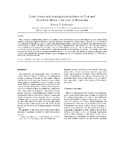| dc.contributor.author | Kalabamu, F.T. | |
| dc.date.accessioned | 2013-04-04T12:00:25Z | |
| dc.date.available | 2013-04-04T12:00:25Z | |
| dc.date.issued | 2000 | |
| dc.identifier.citation | Kalabamu, F.T. (2000) Land tenure and management reforms in East and Southern Africa - the case of Botswana, Land Use Policy, Vol. 17, No. 4, pp. 305-319 | en_US |
| dc.identifier.issn | 0264-8377 | |
| dc.identifier.uri | http://hdl.handle.net/10311/1134 | |
| dc.description.abstract | Since attainment of independence, almost every country in East and Southern Africa has introduced some kind of land reform
aimed at reconciling indigenous land tenure practices and those introduced by colonial regimes. The reforms have centred on
modi"cation of tenurial rules on access, ownership, administration and transfer of land rights coupled with land redistribution and/or
restitution in some countries. With the exception of a few countries, such as Botswana, land reforms have largely remained on statute
books with little to show on the ground. The paper gives an overview of land reforms in East and Southern Africa, taking Botswana as
a case study. It notes that although Botswana has largely been successful in implementing land reforms, it is currently experiencing
land tenure problems, especially in peri-urban settlements and inner city low-income areas, despite government's enhanced control
over local land administrative structures. The paper ends with suggestions on how to contain the current problems. | en_US |
| dc.language.iso | en | en_US |
| dc.publisher | Elsevier Science Ltd. http://www.elsevier.com/locate/landusepol | en_US |
| dc.subject | Land tenure | en_US |
| dc.subject | Land rights | en_US |
| dc.subject | Land reform | en_US |
| dc.subject | Botswana | en_US |
| dc.subject | East and Southern Africa | en_US |
| dc.title | Land tenure and management reforms in East and Southern Africa - the case of Botswana | en_US |
| dc.type | Published Article | en_US |

